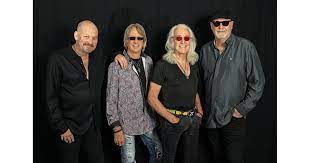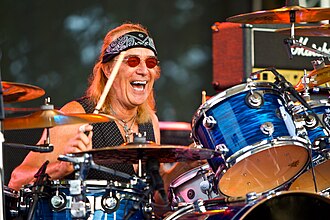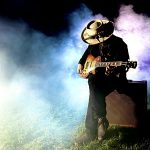In 2025 Foghat return to the UK for a three date mid-November visit (full details at the end of this feature). With over 1,389,000 listeners following on Spotify, Foghat are just getting ready for the next round!
Roger Earl, drums (1971–1984, 1993–present)
Bryan Bassett, lead guitar, slide guitar, backing vocals (1999–present)
Rodney O’Quinn, bass guitar, backing vocals (2015–present)
Scott Holt, lead vocals, lead guitar (2022–present)
In 2023 the band released the acclaimed new album “Sonic Mojo” which climbed the blues chart on both sides of the Atlantic. It was their seventeenth album and topped the Billboard Blues album chart in the US. It’s an interesting album that we discussed at the time with lead singer Scott Holt and included a range of original compositions and some blues classics from BB King, Chuck Berry and Willie Dixon.
With the band heading over the Atlantic we grabbed the chance to chat to the drumming legend Roger Earl, one of the founding members of Foghat and still pounding the drums with passion after 54 years in the band. The following interview is a wonderful catch up as we discuss blues and rock legends over the decades as well as reflect on Foghat yesterday and today.
We began by noting our sadness at the passing of the great American guitarist Ace Frehley in October, and how much we already miss him (our obituary linked here). We also noted how Kiss opened for Foghat back in 1974 (at Cedar Rapids IA).
Roger: I knew Ace. Rock n’ Roll! Of the band I knew Ace the best. I also knew “Tex” Holmes who was Ace’s guitar tech in the seventies. Ace had this distinctive voice (Roger does a quick impression- ‘How y’ doing?) and he was a huge part of the Kiss sound. Like so many of us in the business he had his issues and troubles but his passing was so sad as he was doing so well and had found fame again with his band getting together and touring.
It’s been a sad year, losing Ozzy too. Another hero of rock.
Roger: I lost another friend of mine, drummer Thommy Price (Billy Idol, Blue Oyster Cult, Joan Jett and the Blackhearts, Scandal).He was a great drummer, the way he played was great and I met him a few times when he was over here in our old studio at Boogie Hotel and he did some sessions there.
Is it true that Roger Earl went to see Elvis in concert, while we are discussing legends.
Roger: No, wrong! That’s our lead singer and guitar player Scott Holt, he saw Elvis as his parents took him when he was a child and it made a big impression on him. Personally, I was a Jerry Lee Lewis fan and I was taken to see him when I was maybe thirteen. My Dad was a bit of a piano player, but his day job was a panel fitter at Aston Martin. But my older brother Colin Earl who we lost this year played electric piano for Mungo Jerry; and Ray Dorset the singer of Mungo Jerry was the singer of the very first band I was in when I was maybe sixteen. The bass player in that band was Dave Hutchins and he helped get me in the band. So…I spoke to Ray Dorset about six months ago and he was a terrific guitar player and singer and when you are sixteen and in a band with such talented people then that was a huge asset to me. Ray was a great songwriter even back then.
Staying with legends and listening to “Sonic Mojo,” the song “She’s Dynamite” makes an appearance. How did Foghat approach that one to add their own imprint to the track?
Roger: To go backward, as I said I loved Jerry Lee Lewis, Little Richard and Johnny Cash. In those days I was thirteen years old and riding my bike around South West London. I’m singing Johnny Cash Songs and he was on Sun Records along with BB King. I knew BB with that connection. I first went to the States in 1969 with Savoy Brown and we did some shows with BB on the bill, he must have been in his early thirties then. So in a blues band on my first trip to the states I am there on the same stage as BB King! I was a kid from London, and he was brilliant on guitar and singing. I met him a couple of times and he was a beautiful man. These were wonderful music pioneers, those early blues men. Willie Dixon wrote so many great blues and rock n’ roll songs. There would be no rock n’roll without Willie Dixon. I got to meet him and our first hit in the US was “I Just Wanna Make Love to You” which was written by Willie and has been done by Muddy Waters too. But we had a hit with it and we later did a live album that had that track on, and he was getting money from the royalties. We had three nights in Chicago and his daughter came down, and she was treated like a princess. On the second night his son “Butch” came down with his sister, he later became the road manager for Willie. On the third night Willie Dixon came down and our singer introduced him on stage saying “without Willie Dixon there would be no rock n’ roll.” The interesting thing is that Willie sent his kids down first to check out these white lads as he was getting all this money from the royalties as we had done his song. Then we were invited over to his house on the south side of Chicago, and we headed over there about six months later for dinner with him and the family and that was great, we were up late listening to records and playing music. One of his daughters at the time was around 7 years old, but we met her recently and she was in charge of the Willie Dixon Blues Foundation (link) and the band went over there, and when we were there she came over to tell me that she was serving us dinner as a child all those years ago and her mum had pulled her over to ask “What do white people eat?!” So…I have got to meet some of my wonderful heroes.

BB’s daughter Shirley King told us how her dad was a great entertainer, the blues was entertainment, not sitting morose to sing about how he did his woman wrong!
Roger: Well, Buddy Guy is one of the last of the greats. Back in time I presented the blues awards to Buddy Guy in Memphis and I met him a number of times as our lead singer Scott Holt played with Buddy Guy for ten years. Buddy Guy is absolutely brilliant and Jimi Hendrix once said that Buddy was his main inspiration. Buddy Guy would play over his head, with his teeth, whatever! He is still going strong.
Lead Belly is another one, we did a piece on him for the magazine. What an amazing character, once in prison for murder but released because the warden loved his guitar playing. These were such characters!
Roger: Remember just how hard it was being Black and growing up in the American South then. Even in the late sixties when I came here we were down south in Carolina and so forth and there was still segregation going on, and it wasn’t good. Major cities like New York and Chicago were fine, but down South in the smaller towns it was still very wrong. Most of my musical heroes were Black, so these were not good times.
The Beatles refused to play in front of segregated audiences in the U.S., notably canceling a Jacksonville, Florida show in 1964 and later including a contract clause in 1965 prohibiting segregation. So they came across it and resisted it.
Roger: I’m sure, and good for them. I never had to make that statement, but there is still tough shit out there. But, for me, modern music began with the blues, Black music in the blues, jazz, Gospel and so forth. Folks came from Europe and joined with their folk songs and melodies, Ireland especially, the Spanish too and it all came together.
Look at Nina Simone, she originally wanted to be a classical pianist and sang gospel wonderfully.
Roger: I watched a film about her recently, a festival recorded in 1969 around the same time as Woodstock. She was absolutely brilliant. But she suffered some horror shows in how she was treated. The song “Strange Fruit” – a lot of places she was banned from singing that. Fuck that, what a great song.
Foghat often get referred to as a boogie blues band, perhaps the nearest equivalent would be Status Quo in Britain who, although never popular in the US, strong bluesy, boogie-woogie influence, and this sound is evident in their music from albums like Ma Kelly’s Greasy Spoon (1970). Is Roger happy with the tag boogie rock?
Roger: I’m not sure about comparisons, but I would love to have played a festival back in the day with Foghat, Status Quo and ACDC. That would have been cool! To be fair, it was Dave Peverett (“Lonesome Dave”) our original vocalist who said that first! Quo played a great shuffle boogie, and we probably do too!

Foghat Live (1977) went double platinum, giving Foghat their biggest hit album (making number 5 in Canada and 11 in the US charts). Returning to Kiss, their biggest album was also a live album, Alive (1975). What does Roger feel about the future of the album today, given that every live show today appears full of people with mobile phones who put the gig up on YouTube within a day of its event.
Roger: Depends on the band. Foghat was always about playing live, the live album is a testament on how good we were in that era, we played life and that was in our blood and in the DNA. I never liked having time off and nor did Lonesome Dave, we loved playing on the stage and the buzz you get from the audience. We were there to entertain and make sure you forget your troubles and bills for the time you watched us. Our job is to take you away from your worries. And we were fortunate. I am fortunate to still be doing what I love and I have lost six members of this band who have passed on…but the current incarnation is great and our last album did fine. But the live album, we have done live albums since just because we can. We have our own studio down in Florida and in fact we have four or five live tracks from last year…we record nearly every night if practical. That may come out on an EP next year. There are a few tracks never recorded live before, some from the first album.
Times have changed. Some artists do everything in their bedroom and never come out today! But as a magazine we try to highlight the plight of the small venues that have been closing. It is not good enough to point to huge acts like Oasis or Taylor Swift and note they are selling stadiums as evidence for a thriving industry. For the independent artist they still need to generate an audience and playing life means you connect to people, you need the small venues but they have closed down everywhere.
Roger: I think playing life is imperative. Take you back to when I was growing up, that first band I was in with Ray Dorset, we were in a room above a pub aged maybe 17 and we were getting maybe 300 people. We would put up posters around south west London and that was how we started. I don’t know how these young bands get a gig now adays. As a drummer I play for the song, I listen to the bass player, I listen to the singer, to the lead guitar. I play for the music and I wanted to be in a band. I took lessons, and learned to play while listening to records.
What does Roger think of electric drum kits? My son loves his kit, but what does Roger make of them?
Roger: I have an electric kit upstairs! About ten years ago I fell off a stage and broke my back and was incapacitated for about three months. But they are a great tool and there is some fantastic stuff out there now, you can get some great drum sounds out there. The cool thing is the bounce you get off the head. It is a great tool and during COVID I did a few things for fun with it. I use DW drums, I endorse them and feel they are the best out there. I also use Salyers sticks and Paiste cymbals. I bring my kit on the road whenever I can, I carry the double pedals, snare drum and so forth, but on long journeys I will use a rental company to get my specs.
The decades pass…
Roger: Yes, I will be eighty next year.
Ringo is still there at 85, looking younger than ever….women and song perhaps!
Roger: No, he puts that down to broccoli. I have a pair of Ringo drumsticks down at the studio that were signed by him. “Come Together” – the way he played that. Ringo is great, so cool, what a talent. But my favorite Beatle was John. We have been down at the studio recently working on a new album and after recording Scott and I watched “Imagine” with John and it is so awful what happened to him, but I loved how he stirred it up and made people think. John was a rocker and he would have been fabulous had he still been round today, he made you think. So sad he was taken from us.

For us it was never about success as much as it was about the music, enjoying the music. I love playing in a band and have never lost that desire and love. And we are coming to the UK again, we are playing the South Coast in Great Yarmouth, we are playing the O2 at Shepherds Bush and I am so excited about that one as my eldest daughter will be there, cousins, relations, everybody. I’m so excited about that one. Also we are heading to Manchester, so come and see us.
And that closes down this interview with the wonderful Roger Earl. If you love boogie rock then hit the road and check in on Foghat this November. From the smoky blues clubs of the ’70s to today’s digital age, Foghat’s rhythm has never stopped rolling. Roger Earl continues to fly the flag for honest, hard-working rock — the kind that moves the soul as much as the feet. As the band return to British shores, one thing’s for certain: the boogie still burns bright.
And we hope you liked the review, dear reader! If you did, please check out the other pages of the magazine; we have many great features, merchandise pages, shops, editorials and even a poetry page. Content is free here, but we work hard for you, and to support the magazine, please show your appreciation on the support button below and buy me a coffee!
Band Website here
Stream Music from Foghat here
By Mark C. Chambers



